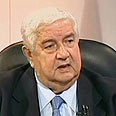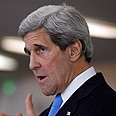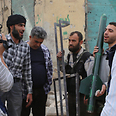


The decision by the United States and its allies to arm rebel groups in Syria is "very dangerous" and will prolong the violence and killing, Syria's foreign minister said Monday.
The warning came as an artillery shell slammed into a village in central Syria and killed 11 people, including a woman and six of her children, activists said, and a leading human rights group charged that Syrian forces are abusing women in custody for supporting the opposition to President Bashar Assad's regime.
Related stories:
- Syria-linked clashes kill at least 8 in Lebanon
- Kerry: Syria urgently needs political solution
- Report: Iran to send 4,000 soldiers to Syria
Walid al-Moallem said sending more weapons to the opposition would also hinder efforts to convene a peace conference in Geneva to work on a negotiated solution. He said his country remains ready to take part but added that Assad will not step down. His resignation is a key opposition demand to be raised in any talks with Damascus.
Al-Moallem spoke two days after an 11-nation group that includes the US met in Qatar and agreed to step up military and other assistance to the Syrian rebels. He said all those who met in Qatar "have Syrian blood on their hands."
US Secretary of States John Kerry, who took part in the conference, would not disclose details of the aid, saying only that it would re-balance the fight between the rebels and the government. Assad's better-equipped forces are increasingly backed by fighters from Lebanon's Hezbollah militant group.
"They will not be victorious no matter how much they conspire," al-Moallem said. He said arming the rebels "is a dangerous decision because it aims at prolonging the crisis, prolonging the violence and killing and encouraging terrorism."
President Barack Obama's change of policy was partly based on a US intelligence assessment that Assad had used chemical weapons, but Kerry expressed deeper concern about Assad's foreign support. He said that Iranian as well as Hezbollah fighters had joined the war.
Al-Moallem denied that any Iranian fighters were in Syria. Damascus acknowledges that Hezbollah is assisting government troops.
The foreign minister said his regime was willing to take part in a peace conference, but would go to Geneva not to hand over power to the other side but rather to establish "a real partnership" and a national unity government that includes representatives of all Syrian society.
"President Bashar Assad will not step down," he said. "If anyone has such illusions on the other side, my advice to them is not to go to Geneva," he said, rejecting the opposition's demand that Assad's departure from power should top the agenda in at the peace conference.
He insisted Syria will not accept any solutions or ideas dictated from the outside.
Syria's main opposition bloc said the willingness of Assad's regime to attend the peace talks is not genuine and neither are the government's assurance it want to "build a real partnership" in Geneva.
"As it has done with all previous initiatives of the U.N. and Arab League missions, the Assad regime is stalling for time by attending Geneva," the statement by the Western-backed Syrian National Coalition said. "For Assad, this creates an opportunity for more destruction and for the Assad forces to gain more ground in Syria."
Syrian government troops clashed with opposition fighters Monday in central provinces of Homs and Hama. An artillery shell slammed into the village of Tarfawi in Hama province, killing at least 11 people, including a woman and six of her children, the Britain-based Syrian Observatory for Human Rights said.
The group relies on the network of activists inside Syria. It said government forces fired the shell.
More than 93,000 people have been killed in Syrian conflict that started in March 2011 as largely peaceful protest against Assad's rule. The uprising turned into a bloody insurgency in response to a military crackdown by regime forces on the protest movement. In the past year, the war has taken on increasingly sectarian overtones.
Also Monday, a rights group said Syrian military and fighters recruited from Assad's Alawite sect have arbitrarily detained female opposition activists, female relatives and neighbors of opposition activists and fighters, abusing and torturing them in custody.
Human Rights Watch said in a report that its activists interviewed 10 Syrian women who had been detained. Of the 10, eight were jailed because they were anti-government activists. All said they were abused by the security forces and the Alawite militiamen, known as shabiha, while in custody.
The abuse included electric shocks, extended time in stress positions, and beatings with metal rods, wires and nightsticks, the US-based group said in a report. In a number of cases, women were also subjected to torture and sexual abuse, it charged.
The eight women were detained by the security forces at checkpoints or military raids on their homes. They were in custody for up to 14 months between February 2012 and April 2013, the group said.
HRW has been documenting abuses on both sides of Syria civil war during the 27 months of conflict.
The group said it has not received information about opposition forces detaining and mistreating female Syrian government supporters or relatives of those associated with government forces.
- Receive Ynetnews updates
directly to your desktop















